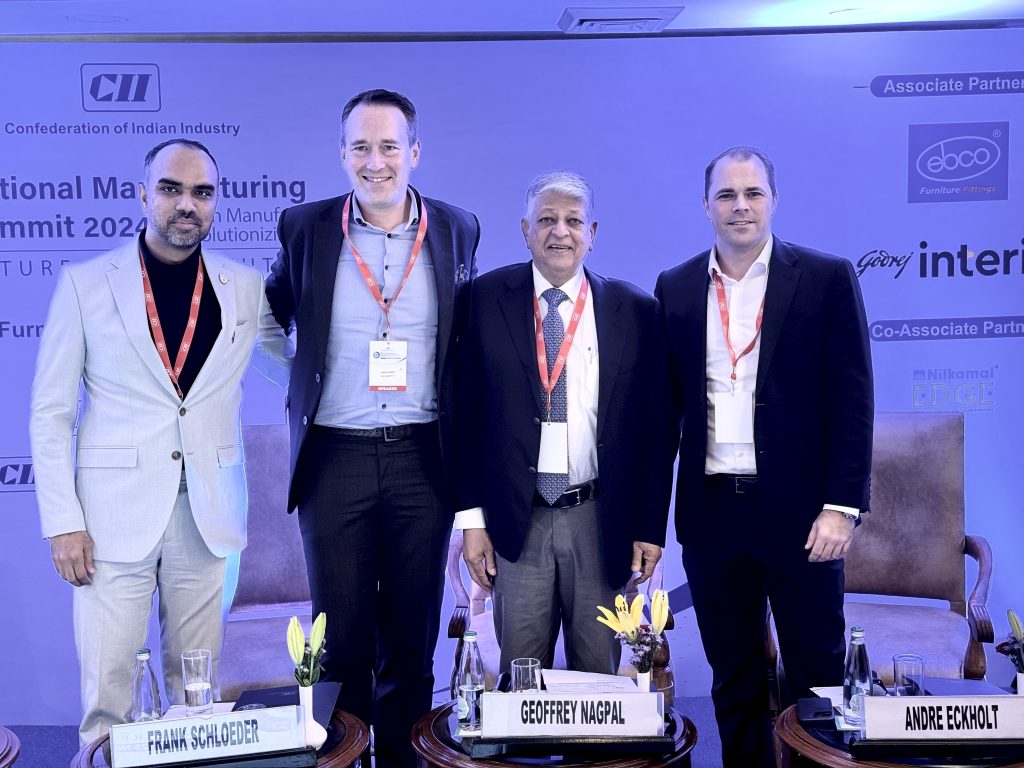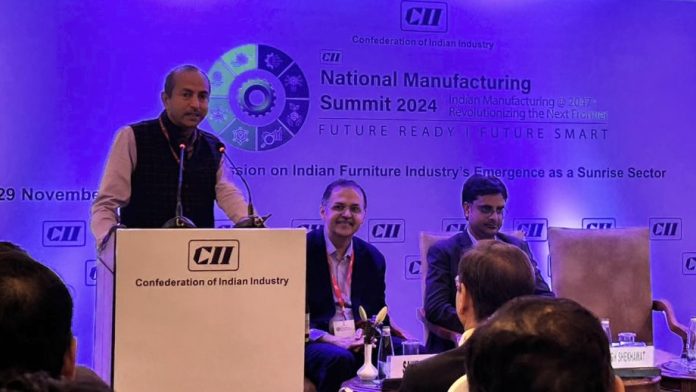Several factors have contributed to the government viewing furniture as a sunrise sector. India is the 5th largest producer and 4th largest consumer of furniture globally. As per a CII study, India’s furniture market was valued at around $23.12 billion in 2023. It is expected to grow at a CAGR of 10.9 per cent during 2023-28 to reach $32.7 billion by 2026.
According to CII, in the context of global trade India’s contribution to total import of furniture in the US, Germany and the UK stands at 2.48 per cent, 1.99 per cent and 1.66 per cent respectively. This reveals a significant opportunity for domestic industry to expand its presence in these and other markets and increase market share.
The emergence of Indian furniture as a sunrise sector was highlighted at the recently held CII National Manufacturing Summit 2024: Indian Manufacturing @2047, where DPIIT Jt Secretary Sanjiv Singh addressed furniture and allied industry doyens and discussed specific policy issues.
“The importance of this sector can be gauged from the fact that furniture is among the industries included in the SCALE Committee of the Ministry of Commerce & Industry,” he said.
SCALE (Steering Committee on Advancing Local value-add & Exports) Committee was set up in the aftermath of the March 2020 lockdown. Its objective was to explore innovative ways of increasing local value addition in critical sectors of manufacturing, at a time when global supply chains were being disrupted. The task of this joint government-industry panel was to steer Indian manufacturing away from the dangers of import dependence, through increased localisation and domestic component manufacturing.
“Indian companies can become global champions and India can emerge as a global furniture hub. However, this would require a concerted effort in product and process innovation. Corporate innovation programs are a good way to support and mentor start-ups that are using technology to innovate every aspect of business. I urge CII to take the lead and come up with a start-up program for the industry,” Singh said.
According to Singh, the industry must move beyond crafts-based products. “We have a robust domestic market whereas global markets are opening up through FTAs and PTAs. This makes it incumbent upon you to go for industrial-scale production. You should standardise to international levels, invest in technology, and become efficient and competitive.”
Singh also released the CII Report on ‘Future Momentum: Technology’s Role in India’s Manufacturing Transformation’.
Notwithstanding the favoured status assured by Jt Secretary, Swapneel Nagarkar took the opportunity to highlight that furniture was different from other industries. “Furniture requires a massive boost in investment and merits a PLI scheme. There is huge export potential, considering that presently India contributes a mere 2-3 per cent to global furniture imports.” Nagarkar is Chairman of the CII Task Force on Furniture and Executive Vice President & Business Head at Godrej Interio.
While complimenting the government for issuing Quality Control Orders (QCOs) to make standardisation mandatory through BIS certification, Nagarkar pointed out that more needs to be done. “There is a need to review the duty and levies regime, which categorises furniture as a luxury product. We should also develop a dynamic forest policy that will boost domestic generation of basic raw material across the geographies and all the year-round so that we can be successful at import substitution.”

The industry has seen a spate of QCOs over the last couple of years, including hinges and ball-bearing sliders, laminates and panel boards, and complete furniture. However, it has been at loggerheads with the Bureau of India Standards (BIS) for a review of the standards, which are considered too exacting and not suited for Indian conditions.
The industry has also been lobbying DPIIT for a review of the QCO timelines, asserting that getting certification is easier said than done, not to mention the absence of domestic production capacity to make up for disqualified imports.
According to Andre Eckholt, managing director of Hettich India, the country’s largest manufacturer of furniture fittings, “The BIS certification process needs to be made faster, as India is facing a capacity bottleneck. Not all the fittings are made within the country and we have to source them from our global factories. Therefore it is important that certification of our overseas facilities should be done on priority.”
Germany-based Hettich, which has a 50:50 JV with the Poddar Group in India, has invested over Rs 2,000 crore during the last decade in setting up production complexes at Vadodara and Indore. “We started by making wire baskets in 2013, and the ease of doing business in India encouraged us to make in India for the world. Today 30 per cent of our hinge production is being exported to China. Our Indore plant is as modern as our factory in Germany. Even the machines we use in our factories are made by us. Very shortly we will be setting up an R&D centre in India for our global operations,” Eckholt said.
Hafele, the other German fittings major with a significant presence in India, is also advocating a more realistic alignment of certification timelines, given the market realities and procedural delays. “There are concerns about the uncertified inventory in the supply chain and a mismatch in the QCO timelines. While the deadlines are six months away, the certification process for overseas factories is expected to take as much as nine months. So, there is a financial impact. But the larger impact on India’s ease-of-doing-business image should not be overlooked,” said Frank Schlöder, Hafele India’s managing director.
Schlöder explained that Hafele manufactures only 10 per cent of its products globally, and in India also it has developed a wide base of suppliers, most of whom are SMEs. “We have developed 100s of suppliers and are helping them become compliant with the certification requirements. We are enabling them to make for the world, which is also the government’s mission. Our goal is to source 30 per cent of our requirements from domestic suppliers by 2035 and 50 per cent thereafter.”
While assuring that the government viewed furniture as a sunrise sector and was determined to make the Indian industry a global champion, Singh highlighted the achievements of homegrown fittings maker Ebco, whose factory he had visited recently and came away quite impressed.
“More Indian enterprises should invest in technology and processes. It is heartening to note that Ebco has built a modern production set-up with in-house development facilities. They have set benchmarks for other Indian firms in the allied sector.”
Ebco was recently in the news when private equity firm Warburg Pincus announced that it had acquired a majority stake from the Nagpal family, Ebco’s founders. Ebco is India’s third largest fittings manufacturer, with a turnover of Rs 791 crore.
Geoffrey Nagpal, Ebco’s founder and managing director, who was present at the Summit, credited product innovation for his company’s success. “In the last few years, we have been introducing three new products every week. This has helped us to become the favoured supplier of fittings in the office furniture segment as well as the home furniture segment, which includes kitchens, cabinetry and beds.”


